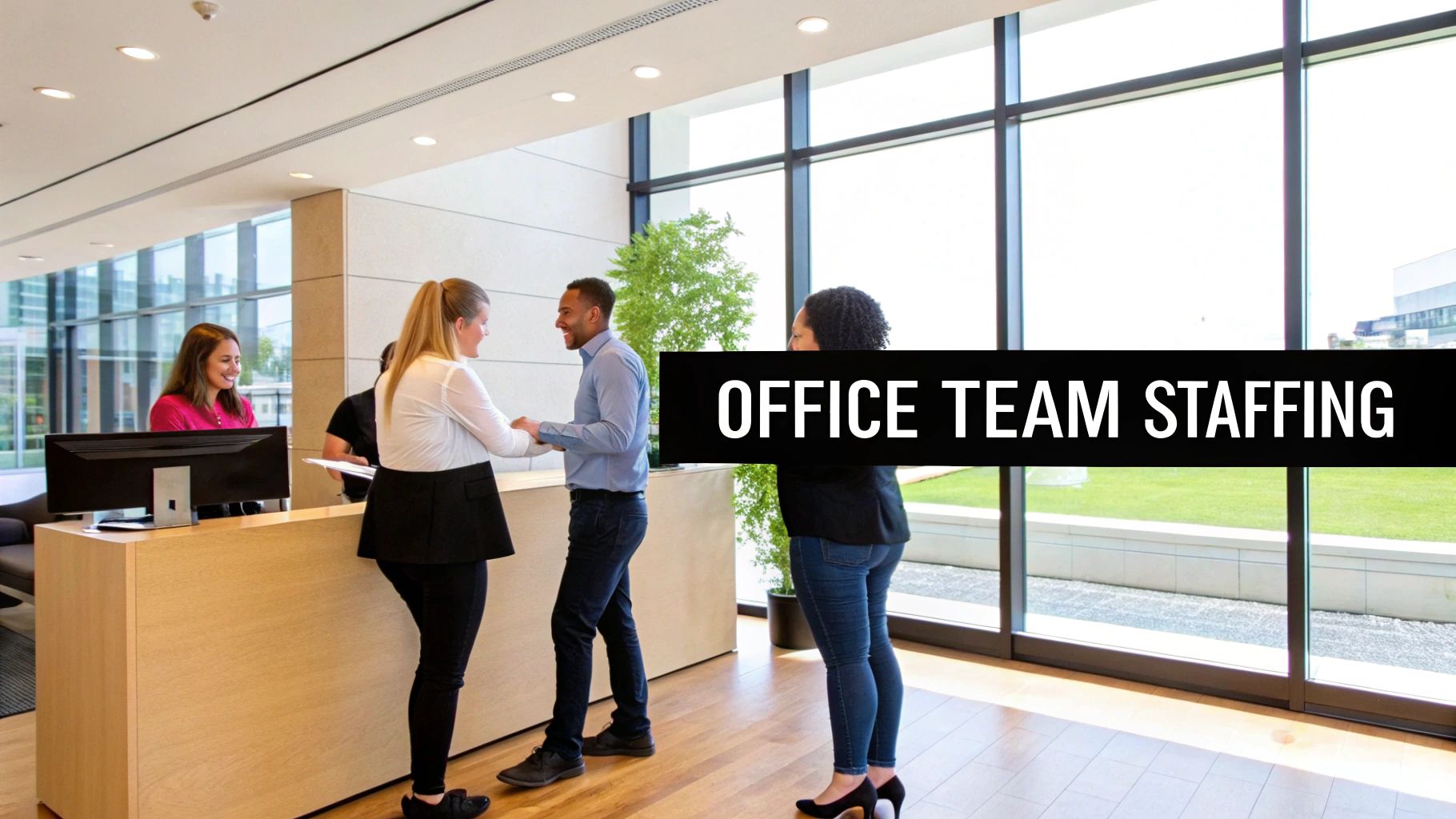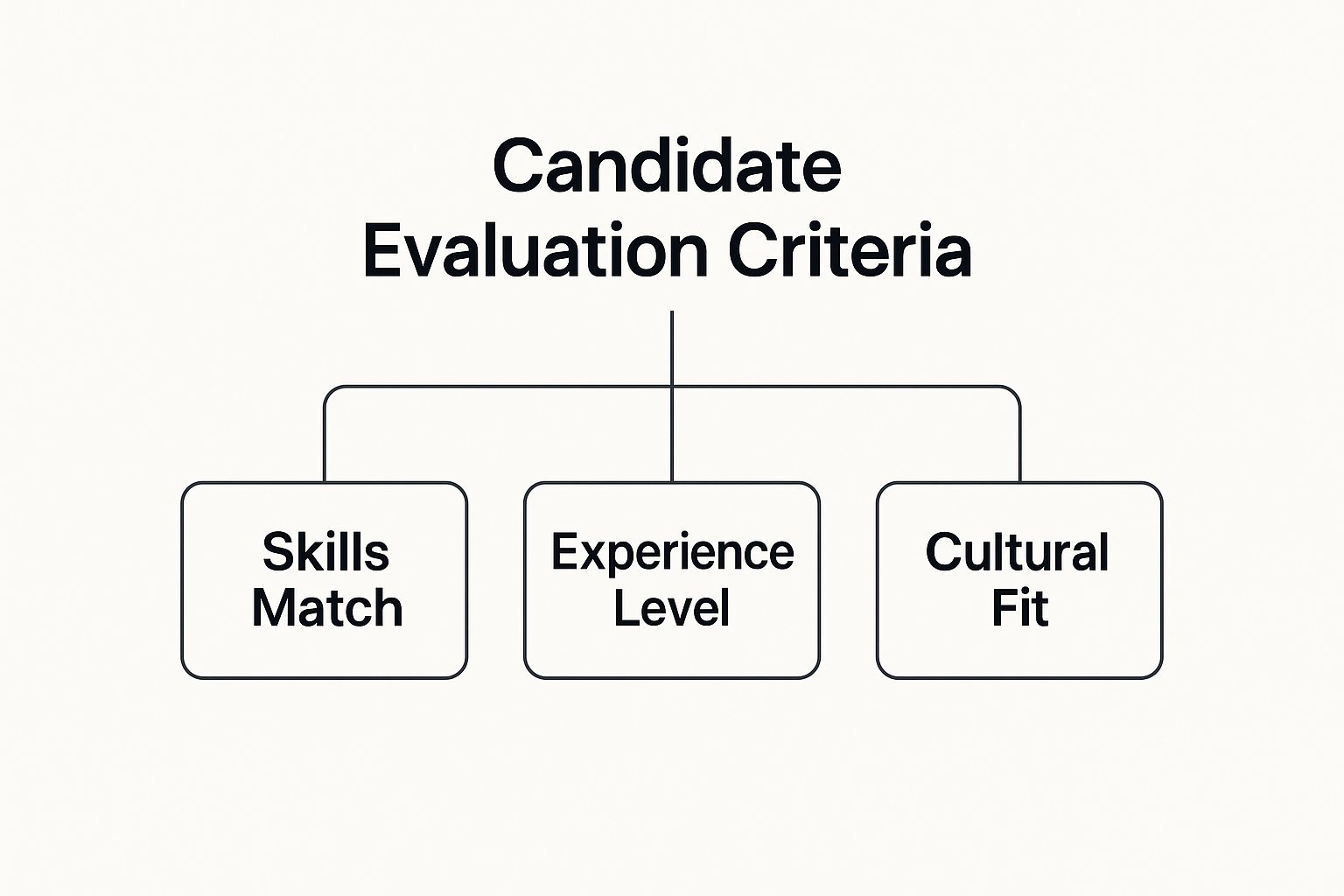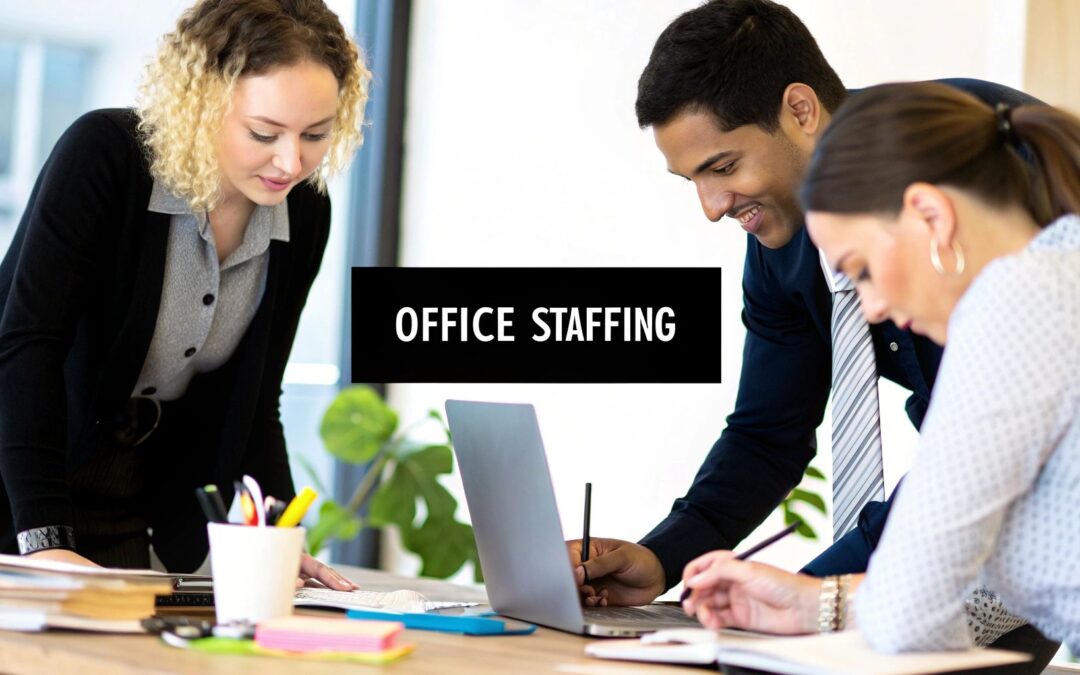Think of an office team staffing agency as a specialized recruitment partner that connects businesses with pre-screened administrative and clerical professionals. They're essentially matchmakers, saving companies a ton of time by keeping a bench of talent ready for roles like receptionists, data entry clerks, and office managers.
What Exactly Is an Office Team Staffing Agency?

Let's break this down. Imagine you need to hire an admin assistant, but your HR team is already swamped. Instead of starting from square one—posting the job, sifting through hundreds of resumes, and conducting initial interviews—you could turn to an office team staffing agency.
These agencies have already done all that legwork. They are constantly building, interviewing, and managing a network of skilled office support professionals. They basically act as a dedicated talent pipeline, built specifically to fill the administrative roles that keep your business from grinding to a halt.
This whole model exists because finding reliable, competent office staff quickly is a massive headache for many companies. Using an agency lets you stay focused on your actual business, while they handle the specialized task of sourcing the people who make your daily operations run smoothly.
The Core Function: A Matchmaking Service
At its heart, an agency’s job is to bridge a gap. On one side, you have a business with a specific need—maybe you need a temporary receptionist to cover a three-month leave or a permanent executive assistant for a new C-suite leader. On the other side, you have qualified people looking for that exact kind of work.
The agency is the expert in the middle, managing the entire process from finding candidates to placing them with you. Their real value comes from their deep-down knowledge of the local job market and the precise skills needed for different office roles. If you want to get a better sense of the big picture, you can find great overviews of the staffing agencies industry that explain how it all fits together.
Key Takeaway: An office team staffing agency is much more than just a resume database. It's a living, breathing ecosystem of talent, built on constant recruitment, tough screening, and genuine market know-how.
How They Build Their Talent Network
A good staffing agency is always on the hunt; they're proactive, not reactive. They don’t just sit around waiting for a client to call with a job opening. Instead, they’re always recruiting to make sure their talent pool is full of top-notch professionals.
Here’s what that looks like in practice:
- Active Sourcing: They're constantly scouring job boards, networking on platforms like LinkedIn, and digging through industry forums to find promising administrative talent.
- Referral Programs: The best source of new talent is often their existing network. They encourage happily placed candidates to refer other great people they know.
- Community Engagement: They show up. You’ll find them building relationships at local job fairs, career centers, and professional group meetings.
Once a potential candidate is in the door, they go through a serious vetting process. This is where an agency's expertise really makes a difference. They aren't just matching keywords on a resume. They’re looking for a mix of hard skills (like being a wizard with the Microsoft Office Suite) and crucial soft skills like communication, reliability, and professionalism.
All this groundwork means that when you call with an urgent need, the agency can send someone who isn't just qualified, but who is truly ready to hit the ground running.
The Strategic Value of Partnering with Staffing Experts

Any smart business owner knows that efficiency is key. But when it comes to building a great office team, handling all the hiring yourself isn't always the sharpest move. Frankly, it can be slow, surprisingly expensive, and a major distraction from what you do best—running your business.
Think of an office team staffing agency as a specialized partner in your corner. Instead of carrying the entire weight of recruitment, you’re teaming up with an expert who directly solves common business headaches. They offer a shortcut to vetted talent, slash hiring timelines, and take on the tangled administrative mess of payroll and benefits.
This is about more than just filling an empty chair. It’s about gaining the freedom to scale your team up or down on a dime, cover for an unexpected absence without skipping a beat, and bring in specific skills for special projects—all without the long-term cost of a full-time hire.
Gaining Immediate Access to a Vetted Talent Pool
Let’s get real. Imagine you need an experienced data entry clerk to start next Monday for a critical, month-long project. If you handle it yourself, the process of sourcing, interviewing, and screening candidates could easily take longer than the project itself. This is exactly where an agency delivers its most powerful punch.
A good office staffing agency isn't starting from zero. They have a curated bench of pre-screened professionals who are ready to hit the ground running. These candidates have already had their skills verified, references checked, and professionalism assessed. So when you have a need, you're not posting a job and hoping for the best; you’re tapping into a live pipeline of qualified people.
This instant access is a massive competitive advantage. It means your business can react to opportunities and operational challenges with real speed and confidence. Making these kinds of quick, informed moves is a hallmark of great management, and you can learn more about this approach by exploring data-driven decision making.
Achieving Workforce Flexibility and Scalability
Business demands are never a flat line. You have seasonal peaks, you land a huge project that needs all hands on deck, or a key employee goes on medical leave. Hiring permanent staff for these temporary situations just doesn't make financial sense.
This is where a staffing partner becomes your secret weapon for agility. They give you the power to mold your workforce to what’s happening right now.
- Cover for Absences: Seamlessly bring in a temp to cover for an employee on parental leave, vacation, or sick leave. The work gets done, and you don’t miss a beat.
- Manage Peak Workloads: Easily add administrative staff during your busiest times—like tax season for an accounting firm or year-end reporting for a finance department—and scale back down when things quiet down.
- Support Special Projects: Hire specialists for one-off initiatives like an office move, a system migration, or a major event without bloating your permanent headcount.
A staffing agency lets your business operate like an accordion. You can expand when opportunity knocks and contract when things slow down, all while keeping costs under control.
This kind of flexibility is also crucial for navigating unexpected disruptions. When thousands of municipal workers in Philadelphia went on strike, the city had to scramble to keep essential services running. A flexible staffing strategy allows a business to weather similar curveballs by quickly bringing in the people they need.
Reducing Recruitment Costs and Administrative Burden
The true cost of making a hire is so much more than just the salary. Think about the hours your managers pour into writing job descriptions, sifting through hundreds of resumes, and sitting in interviews. Then, add the cost of advertising the job on multiple platforms. It adds up fast. Working with staffing experts gives you access to proven strategies to improve your recruitment process without the trial and error.
An office team staffing agency soaks up many of these hidden costs. They do the heavy lifting of sourcing and screening, so you only see the top contenders. That alone saves an incredible amount of internal time and resources.
Even better, for temporary and temp-to-hire roles, the agency acts as the employer of record. This is a huge deal. It means they handle all the HR administration, including:
- Payroll processing and tax withholdings
- Workers' compensation and unemployment insurance
- Benefits administration
By handing off these responsibilities, you free up your own team to focus on their actual jobs. The result is better productivity and lower operational overhead. It turns hiring from a costly headache into a streamlined, efficient part of your business strategy.
Choosing the Right Staffing Service Model
Not all staffing solutions are created equal. Picking the right service model is a bit like choosing the right tool for a job—you wouldn't use a sledgehammer to hang a picture frame. Office team staffing agencies offer a few distinct models, and the key is to understand which one aligns with your specific business goals.
The main options really boil down to three core approaches. Each one serves a different purpose, whether you need a quick fix for a few weeks or you're building out your team for the long haul. Let's break them down so you know exactly how they work and, more importantly, when to use them.
The Flexible Solution: Temporary Staffing
Think of temporary staffing as bringing in a specialist on a short-term contract. It’s the go-to model when you need immediate, time-bound support without the long-term commitment. You get a skilled professional to step in, handle a project, and step out once the work is done. It’s all about speed and agility.
This model is a lifesaver in a few common business scenarios:
- Covering Employee Leave: When your lead admin goes on a three-month parental leave, a temp can keep the office running without a hitch.
- Managing Seasonal Peaks: A finance department can bring in extra accounting clerks for the year-end crunch, preventing burnout among their permanent staff.
- Executing Special Projects: If you’re migrating to a new software system, temporary data entry specialists can manage the transfer without pulling your core team away from their duties.
In these situations, the agency handles everything—payroll, benefits, the works. You just pay an hourly rate for the time worked. This keeps your official headcount stable while giving you the muscle to respond to immediate operational demands.
The Trial Run: Temp-to-Hire
The temp-to-hire model is your classic "try-before-you-buy" option. It's a fantastic way to slash the risk that comes with a bad hire. Here’s how it works: a candidate starts as a temporary employee for a set trial period, usually around 90 days.
During this time, you get a real-world look at their performance, work ethic, and—just as crucial—how they click with your company culture. It's a live audition. At the same time, the employee gets to decide if your company is the right fit for them. It’s a two-way street that almost always leads to better, more successful long-term hires.
This model truly offers the best of both worlds: the flexibility of a temporary hire upfront, with the chance to lock in a proven, tested employee for the long haul.
Once the trial period is over, if everyone’s happy, you can extend a full-time offer and bring them onto your payroll. It’s a smart blend of tactical flexibility and strategic hiring, designed to make sure your next permanent team member is the perfect fit.
The Permanent Placement: Direct Hire
When you need to fill a critical, permanent role and can't afford to get it wrong, the direct hire model is the answer. Think of this as hiring a professional headhunter. The staffing agency takes the entire recruitment process off your plate, essentially acting as an extension of your own HR team.
They handle the sourcing, screening, interviewing, and present you with a handpicked shortlist of only the most qualified candidates. This is perfect for high-stakes roles like an executive assistant to the CEO or a specialized office manager, where a bad hire could be seriously disruptive and costly. Many agencies also have deep expertise in setting up efficient workflows, a key part of successful team integration. You can learn more about how to make your office run smoother with our guide on business process automation.
An agency’s vast network and rigorous vetting process are what make finding that needle-in-a-haystack candidate possible. This infographic shows the core pillars they focus on when evaluating potential hires.

As the visual shows, a great placement is about much more than a resume. It’s a careful balance of technical skills, proven experience, and that all-important cultural alignment. By going the direct hire route, you’re investing in an expert-led search to find a lasting, valuable addition to your team.
Comparing Staffing Service Models at a Glance
To make things even clearer, here’s a side-by-side comparison to help you choose the ideal service model for your specific business needs.
| Service Model | Best Use Case | Workforce Flexibility | Business Commitment |
|---|---|---|---|
| Temporary Staffing | Short-term projects, seasonal peaks, employee leave coverage | High | Low (Pay-as-you-go) |
| Temp-to-Hire | Reducing hiring risk, evaluating culture fit before committing | Medium | Medium (Trial period first) |
| Direct Hire | Filling critical, long-term roles with top-tier talent | Low | High (Permanent hire) |
Each model has its place. Your job is to assess your immediate and future needs to decide whether you need a temporary expert, a trial run, or a permanent star player.
How to Select the Perfect Office Staffing Partner

Choosing an office staffing agency isn't just about filling an empty seat. It’s about finding a genuine partner who can directly influence your company's culture and bottom line. The right partner becomes a true extension of your team, but the wrong one can create more headaches than they solve.
To make the right call, you need to look past the sales pitch and get a real feel for how they operate. By asking the right questions, you can find an agency that doesn't just get what you need but is actually built to deliver on it, time and time again.
Assess Their Industry Specialization
First things first: not all agencies are created equal. A firm that’s fantastic at placing construction workers likely doesn't have the network or know-how to find a top-tier paralegal. Your initial step is to confirm the agency has a proven track record in your world.
A corporate headquarters has vastly different staffing needs than a medical office or a fast-paced tech startup. You’re looking for a partner who speaks your industry's language and truly understands the specific skills your roles demand.
When you talk to them, ask direct questions about their experience:
- Sector Experience: "What percentage of your placements are in the [your industry] sector?"
- Role Familiarity: "Walk me through your experience filling roles like [specific job title] for companies like ours."
- Client Examples: "Can you share a few case studies or connect us with references from other clients in our industry?"
An agency with deep roots in your sector will have a much stronger, more relevant talent pool. They just get what "good" looks like for your business. This is especially crucial in specialized fields. For a sense of how specific this can get, you might want to look at our guide on https://ziloservices.com/blogs/top-10-best-companies-in-india-offering-staffing-and-recruiting-for-automated-speech-recognition-asr-services-2025/.
Scrutinize Their Screening and Vetting Process
This is where the real value of a staffing agency shines through. Their ability to properly screen candidates is the quality control that saves you from a mountain of unqualified résumés. Don’t be afraid to ask for a step-by-step breakdown of their process.
A solid screening protocol isn't a single step; it's a series of checkpoints.
A top-tier agency doesn't just match keywords on a resume. They conduct in-depth interviews, skills testing, and reference checks to build a complete picture of each candidate’s capabilities and professionalism.
This all-encompassing approach means that by the time a candidate lands in your inbox, they’ve already been thoroughly vetted for hard skills (like software proficiency) and crucial soft skills (like reliability and communication). As remote work becomes standard, it's also smart to check out resources that identify the best staffing agencies for remote jobs.
Evaluate Their Use of Technology
Modern recruiting is powered by technology. The best agencies use sophisticated software to make their process faster, more efficient, and far more accurate. This isn’t just some back-office tool; it directly affects the quality and speed of service you receive.
This is a huge trend in the recruiting industry. In fact, the staffing agency software market is projected to more than double, growing from about $578.3 million to $1.244 billion by 2032. This explosive growth shows just how essential technology has become for running a modern agency.
Ask potential partners what technology they rely on for key functions:
- Applicant Tracking Systems (ATS) to manage their talent pipeline.
- Skills assessment platforms for objective, data-backed testing.
- Communication tools to keep everyone in the loop—you and the candidates.
An agency that invests in its tech stack is one that's serious about efficiency and results. It's a strong sign that you’re dealing with a forward-thinking partner who has the operational muscle to back up their promises.
The Bigger Picture of the Global Staffing Market
To really get why an office team staffing agency is so valuable, it helps to zoom out and look at the world they operate in. The global staffing market isn't some small, niche corner of the business world; it’s a massive economic engine that directly reflects what businesses everywhere need to grow and succeed.
Think of it as a barometer for the global economy. It expands and contracts with economic trends, adapts to new technology, and shifts with how people want to work.
When you understand this, it builds confidence. Partnering with a staffing agency isn't just a small operational decision. You're actually tapping into a mature, stable, and surprisingly resilient industry. It shows that using an agency is a reliable, time-tested strategy used by millions of companies all over the world.
Unpacking Global Market Dynamics
The sheer size of the staffing industry tells you just how essential it is. After a recent dip, the market is bouncing back in a big way and is on track to hit an estimated $650 billion. This growth isn't happening by accident—it's fueled by strong demand in the world's biggest economies.
In fact, get this: just three countries—the United States, Japan, and the United Kingdom—account for over 50% of the entire global staffing revenue. That really shows how much major economies rely on flexible talent to keep things moving.
When you broaden the scope a bit, you see that seventeen countries, each generating over $6 billion in staffing revenue, make up a staggering 89% of the global market. You can dig deeper into these global staffing market trends to see how different regions are playing a part.
The numbers paint a clear picture: staffing isn't just a "nice to have." It's deeply woven into the fabric of the modern economy, giving companies the agility they need to thrive.
Temporary Staffing Remains the Dominant Force
Inside this massive market, one service model has always been the clear leader: temporary staffing. This is the classic model where businesses bring people in for specific projects or a set amount of time. It consistently brings in the most revenue for the industry, year after year.
So, why is it so popular? It all comes down to a few key advantages:
- Agility: It lets companies scale their teams up or down almost instantly, without the long-term costs and commitments of permanent hires.
- Risk Mitigation: It’s a lifesaver for filling gaps from unexpected employee absences or sudden workload spikes.
- Access to Skills: Businesses can get specialized expertise for a specific project without having to create a full-time role for it.
While permanent placement is certainly growing, especially in the Asia-Pacific region, the core demand for temporary admin and office support remains the bedrock of the entire industry.
The enduring dominance of temporary staffing shows that businesses everywhere prioritize flexibility. An office team staffing agency is the primary vehicle for achieving that agility, making them an indispensable partner in navigating an ever-changing business climate.
Looking at it from this high level, you can see the stability and strategic importance of the staffing world. When you work with an office team staffing agency, you’re not just filling a seat—you’re using a proven, global mechanism to build a more responsive and resilient organization. It’s a smart move, backed by decades of market-tested success.
Common Questions About Working With a Staffing Agency
Even when the benefits seem clear, it's natural for business leaders to have some practical questions before bringing a staffing partner on board. Getting straight answers to these common concerns is usually the last step before moving forward with confidence.
Let's walk through the most frequent questions I hear about cost, quality, speed, and all that legal stuff.
What's This Going to Cost Me?
The price tag really depends on what you need. If you're bringing in a temporary professional, the agency will charge you a simple, all-inclusive hourly rate. That single figure covers the person's wages, all the payroll taxes, insurance, and the agency's fee for making it all happen.
For direct hires—where you're hiring someone onto your team permanently from the get-go—the model is different. You'll typically pay a one-time fee, which is a set percentage of the employee's first-year salary. While that's a direct cost, it's important to weigh it against what you're saving in job ad spending, your team's screening time, and all the administrative headaches.
How Fast Can an Agency Actually Fill a Role?
Speed is where a great agency truly shines. They aren't starting from scratch like your internal team might be. Instead, they're constantly building and nurturing a pipeline of pre-screened, qualified candidates who are ready to work.
- For temporary roles: It's not uncommon to have a skilled professional at their desk within 24 to 48 hours. Seriously.
- For temp-to-hire or direct hire: The search usually takes about one to three weeks. That's a huge improvement over the typical corporate hiring process, which can easily drag on for more than a month.
The real win here is how much you shrink that vacancy gap. A staffing partner keeps your business from missing a beat by having great people lined up before you even realize you need them.
What if the Person They Send Isn't a Good Fit?
This is a perfectly valid concern, and any agency worth its salt has a plan for it. Reputable firms build their entire business on client satisfaction, which is why they almost always offer a performance guarantee.
If a temp isn't meeting your expectations, you just let your agency contact know. They’ll handle the rest, which means finding a replacement quickly—usually at no extra cost to you for the swap. This guarantee essentially takes the risk of a bad hire off your plate, protecting your budget and keeping the work flowing.
Who's Legally Responsible for a Temporary Employee?
This is a big one. For any temporary or temp-to-hire staff, the agency is the employer of record. This is a crucial detail that massively simplifies your life from an HR and legal standpoint.
Essentially, the agency is legally on the hook for:
- Running payroll
- Withholding and paying taxes
- Providing workers' compensation
- Handling unemployment claims
Your job is to manage their daily tasks and ensure they have a safe place to work. This setup frees your team from a significant administrative burden and a lot of potential legal liability.
Whether you need to scale your office team, find specialized talent, or get AI-ready data, Zilo AI offers the end-to-end solutions to drive your business forward. Explore our manpower and data services at https://ziloservices.com.

